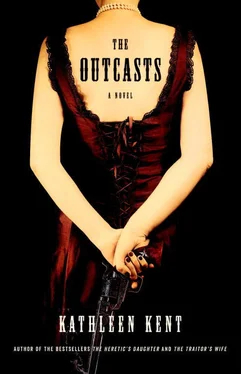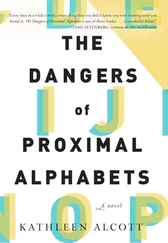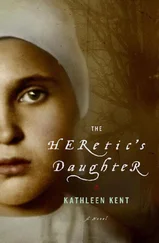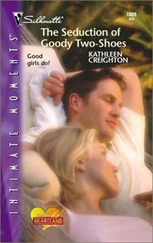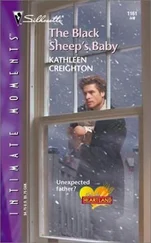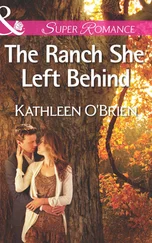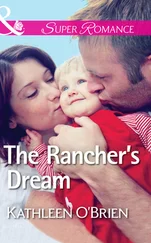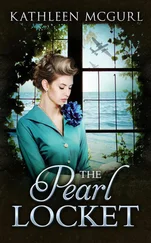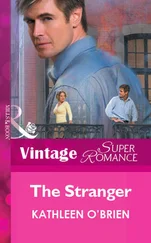Nate was by turns angry and frustrated, and, worse, he was rendered indecisive. At another time, a man firing over his head like that would have earned that man a beating. Even Dr. Tom had grown more quiet and reflective as the days progressed, offering no comments or observations about the actions of his partner.
Nate fed small pieces of wood into the badly smoking stove and they set about eating a cold supper of day-old cornbread and some canned peaches. With their clothes hanging on pegs to dry, they waited for the coffee to warm while listening to the rain turn to hail on the roof. There was an occasional buzzing from the wall behind the wood bin as well, as though the wind were shaking something loose in short, rapid bursts.
Dr. Tom worked at the damper in the stove, and Nate saw a red, puckered crater in the skin on the underside of his arm.
“That,” Dr. Tom said, following his gaze, “was gotten as a child. Pitched from the hay wagon. The baling hook trailing behind sliced into my arm and dragged me for what seemed miles. I almost drowned in the mud before my brother realized I had fallen off.” He smiled, then tilted the can of peaches to his mouth; peach juice dribbled down his chin. “Who says farming ain’t dangerous?” As he lowered the can and wiped his mouth, the buzzing sound came again, and the three of them listened for the source.
After a time, Dr. Tom stood up and reached for more wood in the bin. “Shitfire,” he yelled, throwing himself to the side. “Snake.”
Coiled, with head raised, the diamondback at its thickest was as big around as Nate’s wrist. The strike came, missing Dr. Tom by a handbreadth, and the head recoiled again, but higher up, raised a good six inches against the wall; the rain-dampened rattler buzzed fitfully.
The three of them backed out through the door and stood shirtless under the dripping eaves with the horses.
Dr. Tom said, “It’s not like it hadn’t been warning us for the best part of an hour.”
Shivering, the three reflected for a moment, considering their options. Deerling finally said, “I’ll go back in and get the pistol.”
Dr. Tom shook his head. “Tell it I said hey.”
Nate said, “No. I’ll do it.”
He walked back into the house, grabbing a sodden shirt off a peg. The lantern light was weak; he couldn’t see the snake on top of the bin anymore. He hoped it had slipped back between the kindling and not onto the floor nearby. He stood quiet for a moment and listened. There was an empty rain bucket close to the door, and Nate picked it up and gently toe-heeled towards the stove. A renewed buzzing low down told him the snake had crawled back into the wood bin and would have to be coaxed, or driven, out. It was cold in the room, so they couldn’t sleep in the house without expecting the snake to make for the warmth of their bedrolls.
The stove had little wood in it and had already smoked itself out. Nate opened the wood latch and, using the wet shirt, scooped up a few pieces of wood, still glowing and hot. He dropped the steaming, wadded shirt with the embers into the bucket and closed the wood latch and the damper. He then set the bucket on its side, some distance from the stove, with the open end toward the bin.
Dr. Tom called, “Nate? It’s cold out here…”
Nate looked out the open doorway onto the porch and saw the two rangers wrapped in horse blankets and shivering. He picked up his Henry rifle and, with the butt end, began striking the woodpile, opposite the side where the bucket lay. He heard the distinctive, angry buzzing, and soon the snake emerged at the far end; it crawled towards the warmth of the embers and into the mouth of the bucket.
In four strides Nate had his boot on the bottom ridge of the bucket, upending it, trapping the snake inside. He secured the bucket with several heavy logs and stepped to the door, motioning the rangers back into the house.
Dr. Tom stood over the bucket. “Now, that’s one I haven’t seen.”
“Don’t thank me yet. It’s your shirt in there with the snake.” Nate sat down on the floor, rubber-legged.
“What do we do with it?” Deerling tapped the bucket with his foot, setting off the dull thud of a strike from inside.
“We go to sleep. He’s not goin’ anywhere.”
“You gonna kill it?”
“No, sir.” Nate reached over and grabbed his bedroll, then pulled it around his shoulders. “I believe I’ll leave the killing to you. You seem so eager for it.”
He crawled to a dry spot, lay down, and shut his eyes. Behind closed lids, he thought of his wife. He remembered a day in the first few months of their marriage, remembered her crouching with him outside their small field of corn. Her face was close to his, her breath fogging the morning air. She whispered, “This is the way the grandmothers do it. You don’t kill the snake. He eats the mice that eat the corn.” One of her arms encircled the capture barrel, the thin silver bracelet he had given her bright against her skin. “You make him rest beneath the barrel for an hour while you pick what you need.” She pointed to the warm embers inside the bucket. “The snake is drawn to the warmth.
“Like all living things,” she had said, her fingers tracing heat across his forehead, proving the point.
The students of Middle Bayou were twelve in number, eleven on the frequent days that May did not attend. The oldest was Lavada Waller, a girl who, in Lucinda’s estimation, was almost stunningly thickheaded; the youngest, a sweet, placid boy named Pete who stuttered badly.
On Lucinda’s first day, Euphrastus presented her to the community with an introduction so lengthy that half the students, along with a good number of the parents crowded into the overheated schoolroom, nodded off. He intoned a speech on the virtues of Southern education, which had been cut short during the “War of Northern Aggression,” and revisited in agonizing detail the resultant evils of Federalism, reinforced by Reconstruction.
Lucinda looked over the sad, wilted gathering of settlers, the women in faded dresses, the men in their work denim, and recognized in all of their faces the tenuous look of hope, pale and limpid, painful in its degree of uncertainty, inadequate as a counterweight to the years of starvation, of violence, of sudden death.
During the war, she had worked for a short time nursing the amputees who filled Confederate hospitals. Their missing limbs horrified many of the other volunteers, the women preferring to dote on the soldiers whose wounds were less disfiguring, finding comfort and purpose in feeding their hopes of a return to life as whole men.
To Lucinda, the amputees’ rage—at their dependencies and helplessness, at the dawning knowledge that they would never reclaim their lives as they had been or be without their graceless infirmities—was as familiar and unthreatening to her as her own face. She had recognized the fearful, condemning looks given to them by the hospital visitors and felt her own rage welling up in sympathy. She remembered all too clearly the faces of onlookers and curiosity seekers at the asylum where she had spent her youth. Gawkers who were repulsed and yet fascinated by her wild contortions during a fit and who were irrationally fearful of contracting her violent tremors and deathlike stupors as they might a camp fever. She had learned as a child that nothing could unseat the God-fearing volunteers from their ministrations as quickly as the discovery that they were in close proximity to an unexplained illness.
She had played cards with the soldiers; had held their hands or their arms, or their shoulders if their hands and arms were gone; had changed the seeping bandages on their lower extremities without blanching or turning away. She had fought on their behalf for a fair share of blankets, of food, of medicine. And in fighting for them, she had claimed what had been denied to her as a child.
Читать дальше
